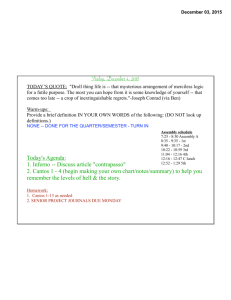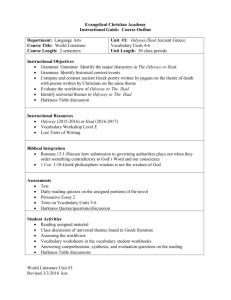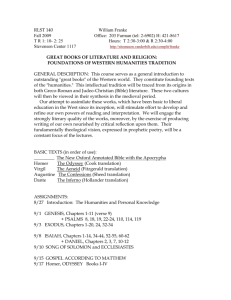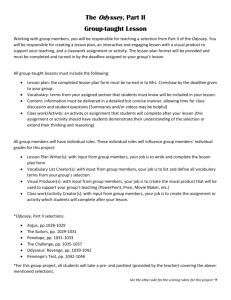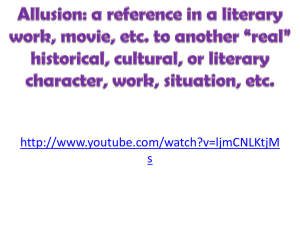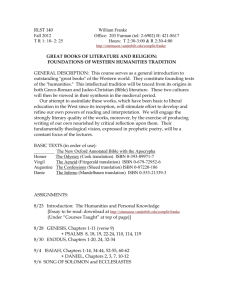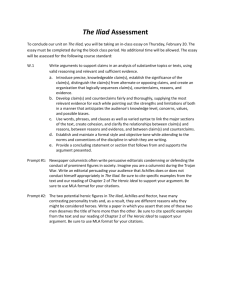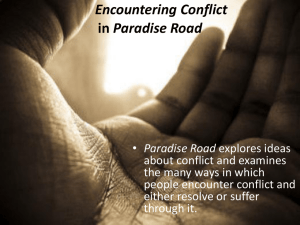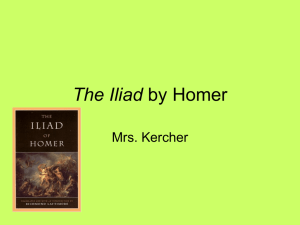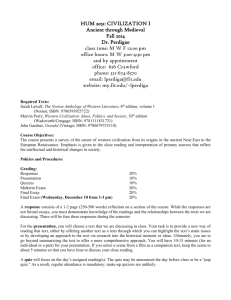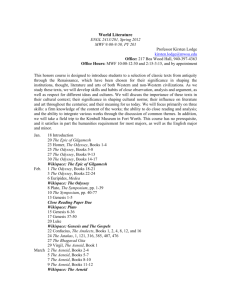English 251 285 Court St., Room 101 Spring 2016 hfriedberg
advertisement
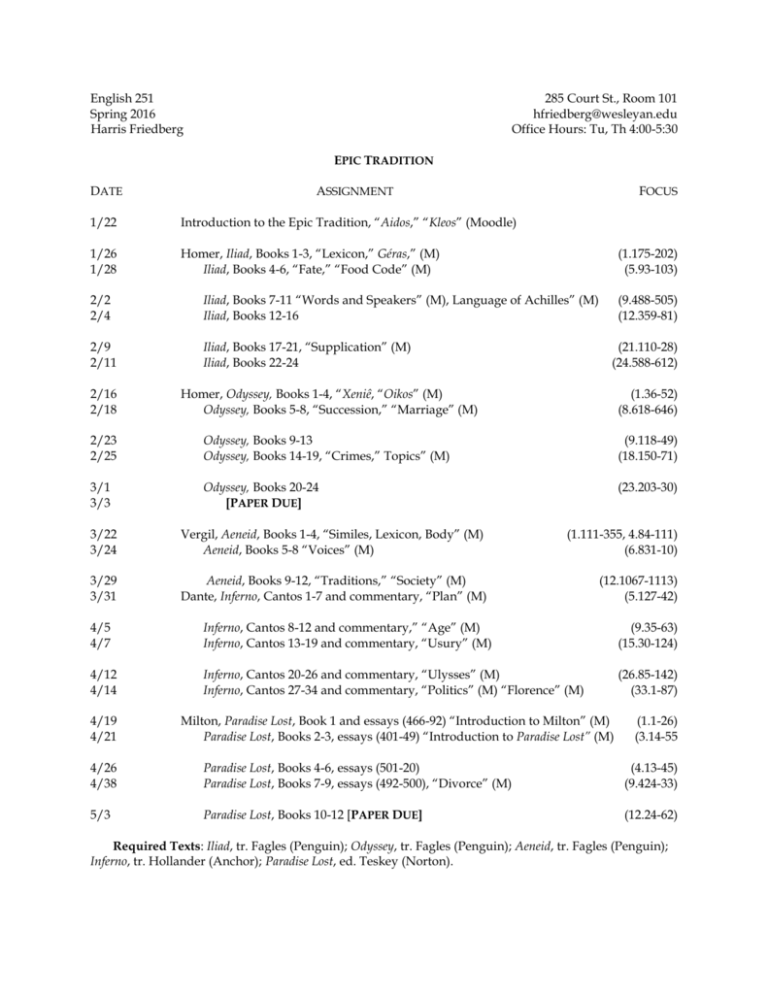
English 251 Spring 2016 Harris Friedberg 285 Court St., Room 101 hfriedberg@wesleyan.edu Office Hours: Tu, Th 4:00-5:30 EPIC TRADITION DATE ASSIGNMENT 1/22 Introduction to the Epic Tradition, “Aidos,” “Kleos” (Moodle) 1/26 1/28 Homer, Iliad, Books 1-3, “Lexicon,” Géras,” (M) Iliad, Books 4-6, “Fate,” “Food Code” (M) FOCUS (1.175-202) (5.93-103) 2/2 2/4 Iliad, Books 7-11 “Words and Speakers” (M), Language of Achilles” (M) Iliad, Books 12-16 2/9 2/11 Iliad, Books 17-21, “Supplication” (M) Iliad, Books 22-24 (9.488-505) (12.359-81) (21.110-28) (24.588-612) 2/16 2/18 Homer, Odyssey, Books 1-4, “Xeniê, “Oikos” (M) Odyssey, Books 5-8, “Succession,” “Marriage” (M) (1.36-52) (8.618-646) 2/23 2/25 Odyssey, Books 9-13 Odyssey, Books 14-19, “Crimes,” Topics” (M) (9.118-49) (18.150-71) 3/1 3/3 Odyssey, Books 20-24 [PAPER DUE] (23.203-30) 3/22 3/24 Vergil, Aeneid, Books 1-4, “Similes, Lexicon, Body” (M) Aeneid, Books 5-8 “Voices” (M) (1.111-355, 4.84-111) (6.831-10) 3/29 3/31 Aeneid, Books 9-12, “Traditions,” “Society” (M) Dante, Inferno, Cantos 1-7 and commentary, “Plan” (M) (12.1067-1113) (5.127-42) 4/5 4/7 Inferno, Cantos 8-12 and commentary,” “Age” (M) Inferno, Cantos 13-19 and commentary, “Usury” (M) (9.35-63) (15.30-124) 4/12 4/14 Inferno, Cantos 20-26 and commentary, “Ulysses” (M) Inferno, Cantos 27-34 and commentary, “Politics” (M) “Florence” (M) (26.85-142) (33.1-87) 4/19 4/21 Milton, Paradise Lost, Book 1 and essays (466-92) “Introduction to Milton” (M) Paradise Lost, Books 2-3, essays (401-49) “Introduction to Paradise Lost” (M) (1.1-26) (3.14-55 4/26 4/38 Paradise Lost, Books 4-6, essays (501-20) Paradise Lost, Books 7-9, essays (492-500), “Divorce” (M) (4.13-45) (9.424-33) 5/3 Paradise Lost, Books 10-12 [PAPER DUE] (12.24-62) Required Texts: Iliad, tr. Fagles (Penguin); Odyssey, tr. Fagles (Penguin); Aeneid, tr. Fagles (Penguin); Inferno, tr. Hollander (Anchor); Paradise Lost, ed. Teskey (Norton). Recommended Websites: Iliad, Odyssey, Aeneid (http://www.perseus.tufts.edu & http://www.loebclassics.com.ezproxy.wesleyan.edu); Inferno (http://etcweb.princeton.edu/dante/pdp/), Paradise Lost (http://www.dartmouth.edu/~milton/reading_room/contents/index.shtml & http://www.darknessvisible.christs.cam.ac.uk/index.html). The Cambridge Companions to Homer, Virgil, Dante, and Milton are also useful (http://universitypublishingonline.org/cambridge/companions/). GOALS: This course is designed to introduce you to the often demanding texts of these crucial works and to the societies that spawned them. They span an enormous period from the dawn of European history to the beginning of the modern era. Our focus will not only be on the works themselves but the stages in the cultural history of the West the works represent and their construction of the most basic ideas of how we conceive of human nature, not as a universal and unchanging given but as a historically inflected product of consciousness. EXPECTATIONS: Students must come to class having read the assignment and closely analyzed the focal passage. Please bring the text to class. You will write two substantial papers. Your papers must develop a critical argument and demonstrate your mastery of the epics by citing and analyzing passages from them; plot summary will not be accepted. The papers will count for 80% of your grade. In addition, you will frequently be asked to submit a one-minute exercise at the end of class explaining what you consider the most important point covered in the lecture or assigned reading and asking one question prompted by them; these will count for 20% of your grade. Your responses and papers must also demonstrate your mastery of all the readings posted on Moodle. Extensions shall be granted only for documented medical reasons or at the request of your class dean. All missed work must be made up within one week. You must complete all written assignments to receive credit for the course. Using other people's words or ideas without attribution is, of course, plagiarism, and the Honor Code requires that any suspicions be reported. If you have any questions about how or what to attribute, please ask me. Attendance is mandatory; more than three unexcused absences will be considered grounds for dismissal from the course. If you must miss class for any reason, please let me know why by email ahead of class; absences will not be excused after class begins. Cell phones, tablets, and laptops cannot be used during class; their use is grounds for dismissal. FORMAT: The course will consist mostly of lectures, especially while we are studying ancient world. As the course progresses, it will include more discussion. Discussion will be successful only if you are prepared. Preparation not only means having read the texts but having studied them and the required readings. The university considers that each credit represents between 120 and 160 hours of work. Please do not take this course unless you are prepared to commit the time to it. DISABILITY RESOURCES: Wesleyan University is committed to ensuring that all qualified students with disabilities are afforded an equal opportunity to participate in and benefit from its programs and services. To receive accommodations, a student must have a documented disability as defined by Section 504 of the Rehabilitation Act of 1973 and the ADA Amendments Act of 2008, and provide documentation of the disability. Since accommodations may require early planning and generally are not provided retroactively, please contact Disability Resources as soon as possible.
